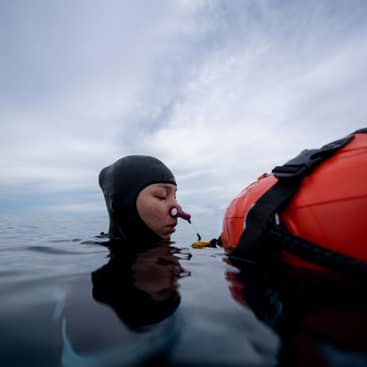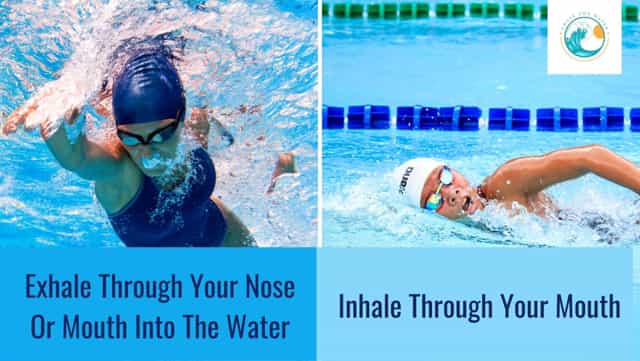It is a horrible, and painful sensation when water goes up your nose during a swim. It is even more difficult when you are in the middle of a lane and have to stop to cough and sputter, losing momentum.
To stop water from going up your nose when swimming, use a nose clip or dive mask. Using a nose clip should only be a short-term solution, as in the long run for maximum comfort, it is best to practice your breathing technique to stop water from going up your nose.
The difficulties of dealing with water going up your nose can only be truly appreciated by those who have experienced it. Some swimmers have never experienced this and some swim coaches have no idea how to help their students out, as they just don’t understand the discomfort.
In this article I am going to look at:
- Why does water go up my nose while swimming?
- How do I stop water going up my nose when swimming?
- Is it bad if water goes up your nose?
- Should you exhale through nose or mouth when swimming?
- Why do Olympic swimmers wear nose clips?
- What are the best nose clips for swimmers?

Why Does Water Go Up My Nose While Swimming?
Typically, water will only enter your nose when you are submerged, on your back, doing a flip turn, or swimming backstroke.
However, it is also possible to get water in your nose as you turn your head to the side while doing the front crawl. In this position, air bubbles might escape from your nostrils and the pressure imbalance could cause water to rush up your nose.
The secret to stopping water from going up your nose is to keep it full of air or to block off your sinuses to keep the air pressure constant.
The air inside your nose keeps water out, so the more air you have inside your nose and sinus cavity, the smaller the risk of water getting in.
The sinuses are a system of connected cavities in the skull and are typically full of air, like a balloon. [source] There is a pressure balance between this air inside your nose and the water.
While full of air, water cannot get up your nose, however, if you breathe out or allow air to get out of your sinuses while submerged, this pressure imbalance will allow water in.
How Do I Stop Water Going Up My Nose While Swimming?
There are two key ways to stop water going up your nose as you swim:
- Use A Nose Clip
- Control Sinus Cavity Pressure – Make A “K” Sound
1 – Use A Nose Clip
For most people who have this problem, a nose clip is commonly recommended.
Nose clips are discreet and comfortable clips that pinch the nose and keep the nostrils shut while swimming.

In my opinion, this should only be a short-term solution and if you can, practice your breathing technique so you can eventually swim without a nose clip.
A nose clip is great as you practice, but personally, I am not a fan of anything that restricts or blocks my air passages as I swim! As I swim, I am usually gasping for air and need all my airways clear to suck in as much air as possible.
2 – Control Sinus Cavity Pressure – Make A “K” Sound
As mentioned, it is typically air escaping from your nose or sinus cavity that causes water to go up your nose while swimming. Once water gets into your sinus cavity, it will hurt!
A common technique to close up your sinus cavity is to make a “k” sound, holding your tongue against your soft palate.
Your soft palate is located at the back roof of your mouth, near your tonsils. [source]
If you make the “K” or “Ke” sound and try to breathe out through your nose, you might find airflow is restricted.
In this position, air pressure is constant and your sinus cavity is blocked off. You have to move your tongue to exhale through your nose or open your sinus cavity.
Water can still come into the nostrils as they are open, but they cannot get into your throat and sinuses.
Practising this technique can help you control your nasal cavity and have more control in the water.
In singing, this is a common technique called “raising the soft palate” which helps tonal quality. I know it is a curveball but the best people to show us how to work with our soft palate are singers!
This is a great video explaining how to control our soft palate which could be secret to stopping water from rushing up your nose.
Assuming you have grasped the idea of blocking your sinus cavity using a “k” sound and raising your soft palate, it can be hard to translate this to the water.
We still need to breathe, and we cannot do that if our air passages are blocked!
The following is an excellent explainer video, taking the idea of blocking the sinus cavity and giving practice drills to get a feeling of how to control your air passages in the water.
Is It Bad If Water Goes Up Your Nose?
As swimmers, we will all get water up our noses at some point, but is it bad for us?
Typically, it is bad if contaminated water goes up your nose.
Some nasty bacteria can live on the surfaces of water, therefore if you are an outdoor swimmer, where the risk of coming into contact with contaminated water and bad bacteria is much higher than in a chlorinated swimming pool, it is worth learning about the dangers and common bacteria found in your local region.
Here is a good article from “Health ENews”, explaining the dangers of bad bacteria getting up your nose while swimming outdoors.
Should You Exhale Through Nose Or Mouth When Swimming?
Many beginner swimmers will hold their breath underwater while first learning to swim. I know I certainly did this!
It was a revelation when I was told to exhale through my nose or mouth while underwater.
If you have a good swimming and breathing technique, then your breathing should feel as natural during a light swim as it would during a light walk.
As a general rule, you exhale through your nose or mouth when your head is in the water and you inhale through your mouth when taking a breath above water.
Many swimmers will breathe in through their nose, which can cause a rapid ingress of water to the nose if it is not clear of the water.

Why Do Olympic Swimmers Wear Nose Clips?
Just like the rest of us, even elite athletes suffer from water going up their noses.
Many Olympic swimmers will wear a nose clip to concentrate on their breathing efficiency, reduce sinus irritation or to stop water from going up their nose, particularly in swim events such as the backstroke where the nostrils are facing skywards.
In addition, some competitive swimmers may suffer from irritated sinuses and wearing a nose clip is the best solution to this problem.
At the end of the day, nose clips are an important swimming tool that have an important function. If the water going up your nose is affecting your fun in the water or ability to swim, then investing in a cheap nose clip might be a solution.
What Are The Best Nose Clips For Swimming?
These are the best nose clips for swimming:
Arena Unisex Swimming Nose Clip for Beginners Soft Padding, Flesh (19), One Size
- Excellent seal
- Very comfortable
- Discrete
Price Range: $6-$8
Arena Nose Clip Pro, Unisex, Nasenklemme Nose Clip Pro, blue,white, One Size
- Very affordable
- Looks good
- Comfortable
Price Range: $9-$10
Zoggs Silicone Swimming Nose Clip with Case, Blue/Clear, Nose Clip Swimming Adult
- Comfortable
- Very discrete
- Secure
Price Range: $6-$8
Speedo Unisex Adult Competition Nose Clip , Graphite, One Size
- Looks good
- Strong
- Popular with competitive swimmers
Price Range: $6-$8




